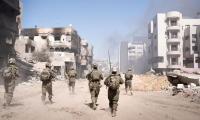ISLAMABAD: Prime Minister Imran Khan on Thursday said it's the government and the ministers, not the media, who feel unprotected.
Giving an interview to Al-Jazeera, Imran Khan in response to a question about freedom of the press and expression in Pakistan said that "blatant propaganda" had taken place against his government. "In my two years of power, tell me how many journalists have been kidnapped in Pakistan," he asked.
Imran Khan said that he had spent 20 years of his life in the UK and he "knew what freedom of speech is". The prime minister said that if he was in the UK and the media there was criticising him in such a manner, his government would "have claimed millions of dollars of damages".
PM Imran called into question the definition of intimidation, saying that if a fake news is published against the prime minister and the premier then decides to take that journalist to court, it should not be called intimidation as it "happens everywhere around the world".
Acknowledging that in Pakistan's history, civilian and military leaderships have had a ‘chequered relationship’, Imran Khan said his government had an excellent relationship with the armed forces. He said "the military stands with us" and that "we have an excellent relationship".
"I honestly think it's the most harmonious relationship, we have complete coordination, we work together, the military completely stands with all the government's democratic policies," he said, adding that the armed forces and the civilian government were on the same page whether it came to the India policy or peace in Afghanistan.
Speaking about the Afghanistan war, he said the 19 years of war had created such "divisions in society" that it was not possible for everyone to get together for peace all of a sudden.
However, he acknowledged that progress had been made in the peace talks. "This is the nearest we have got to peace inAfghanistan and a political solution," he said. "Whatever the Afghans think is good for them, is good for us," he said, adding that Pakistan had done whatever it could to get the Afghan government and the Taliban on the table for talks.
He acknowledged that there were 'spoilers' in the peace process and said that India was not in favour of peace in the war-torn country.
Imran Khan said that India was not a stakeholder in the Afghanistan peace process as it did not have a border with Afghanistan whereas Pakistan did. "Instability there creates instability in the border regions what were former tribal areas of Pakistan and that creates a problem for the whole country," he said.
Speaking on Pakistan-India relations, Imran Khan said that when he became the country's prime minister, he extended "a hand of friendship towards India". "The tragedy of India is that it is being ruled by an extremist," said the PM. "It is an extremist government. It is a Hindu supremacist government inspired by the ideology of the Nazis," he added.
He recalled how the RSS had been thrice banned in India, lamenting that the proponents of such an extremist organisation was in control of a nuclear-armed country of more than a billion people.
In response to a question about whether he thinks Western countries abandoned Pakistan on the issue of Indian Occupied Jammu and Kashmir (IOJ&K), Imran Khan said that many countries unfortunately kept their commercial interests in mind. He said that the world looks upon India as a "huge market" hence it was ignoring such a huge travesty of justice in Kashmir.
"It doesn't mean that we are sitting down and accepting this. We will keep trying," he said. Answering a question about Pakistan's relations with Saudi Arabia, he said that the kingdom will "always be a friend of Pakistan" however, admitting that Islamabad wanted the Organisation of Islamic Cooperation (OIC) to take a front-role when it came to the issue of Occupied Kashmir.
Reacting to the recent normalisation of ties between Israel and the UAE, Imran Khan categorically said that "any one-sided solution" will not work. "Israel must realise this, if they do not allow the Palestinians to have a just settlement, a viable state, this issue's not going to die down. Even if some countries recognise Israel, it's not going to die down," he added.
When asked whether Islamabad was renegotiating its terms of the China-Pakistan Economic Corridor (CPEC) with Beijing, the premier rejected the notion, adding that Pakistan's relationship with its ally was better than ever.
"Pakistan's economic future is linked to China," he said. "China is growing at a faster pace than any other country and Pakistan, you know, can really benefit from the way China has developed," he added.
When asked if Pakistan was resetting its ties with the United States, he wondered why it has to be an "either, or" formula. "Why does Pakistan have to be in any camp?" he asked. "Every country looks to its own interests. Why can't we have good relations with everyone," the premier wondered, adding that Islamabad and Washington enjoyed good relations as both were "partners for peace in Afghanistan".
Rejecting the notion that he had a "small window" to deliver on his promises that he made to voters, he said that Pakistan no longer made policies for the poor. When asked if delivered his promises of economic turn-around, Imran Khan recalled that his government inherited huge deficit, both external and internal, besides serious problems of power sector.
“No country can immediately snap fingers to get reforms get implemented at once. It’s a struggle. Moving the economy and its reformation is not an overnight thing,” he said. "Our construction policy, the education policy and our economic policies are all aimed at getting the poor out of poverty," he said, highlighting his government's healthcare insurance initiative in Khyber Pakhtunkhwa and its aim to introduce a uniform education syllabus across the country as major changes.
To a question on success against corruption, the prime minister said that presently, there was no mega corruption case in Pakistan after it was controlled by the government at top tier. “For the first time in our history, the powerful who misused authority to make money, are being held accountable,” he said.
However, he admitted that corruption prevailed at lower levels requiring a struggle and lots of steps to counter. Meanwhile, the prime minister said Karachi's issues were primarily due to divided administrative powers.
Speaking during a high-level meeting he chaired regarding the Karachi Transformation Plan (KTP), Imran Khan said it was unfortunate that the resolution of numerous challenges that the people of Karachi face — including provision of clean water, sewerage, solid waste management, cleaning of nullahs, and transport — had been ignored in the past.
The unprecedented torrential rains of August laid bare the administrative lacunae, leading to heightened challenges for Karachiites — something the Centre was fully cognisant about, the prime minister said during the meeting.
With regard to the KTP, the premier said the government was setting up an empowered and effective system to make sure the timelines set for various development projects were followed in order to ensure their success.
It was the need of the hour that powers pertaining to the water supply scheme, sewage treatment and disposal, solid waste management, and building control authorities be delegated to an authorised administrator or local government, he added.
The PM-led meeting also reviewed the KTP for the resolution of longstanding problems of Karachi's citizens. Meanwhile, Imran Khan emphasised on making Islamabad a model city equipped with improved health, transport and educational facilities for its residents.
Chairing a meeting on status of transport, clean drinking water and development projects of the federal capital, the prime minister stressed addressing the issue of unplanned expansion of population in Islamabad and suburbs on priority basis.
To meet water shortage in capital, the prime minister directed to expedite the project on supply of water from Ghazi Brotha dam. The meeting decided setting up of Islamabad Mass Transit Authority to ensure completion, management and transport-related matters of Islamabad Airport Metro Bus Project.
The senators of PTI and allied political parties also called on Prime Minister Imran Khan. Parliamentary matters came under discussion, the PM Office said. Meanwhile, Prime Minister Imran Khan directed the Interior Ministry to expedite tabling an anti-torture bill in the National Assembly, as torture goes against the spirit of Islam.
In a tweet, he said, “I have asked Interior Ministry to expedite tabling our anti-torture bill in National Assembly. Torture is unacceptable in a civilised democratic society & goes against the spirit of Islam, our constitution & our international legal commitments.”
Khawar Manika's counsel continued his arguments on Wednesday in a petition filed by Imran Khan and Bushra Bibi
IHC reserved judgment on the petition against registration of cases against former interior minister Sheikh Rashid on...
Saudi woman who was reportedly kidnapped from Islamabad’s residential Sector F-8 in mysterious circumstances, has...
Pakistan Navy warship rescued 8 Iranian fishermen after their boat caught fire in the open sea
SC dismissed appeal against SHC order that turned down application of partner seeking extension of time to furnish...
Executive board of International Monetary Fund will meet on April 29 to discuss the approval of $1.1 billion funding...







